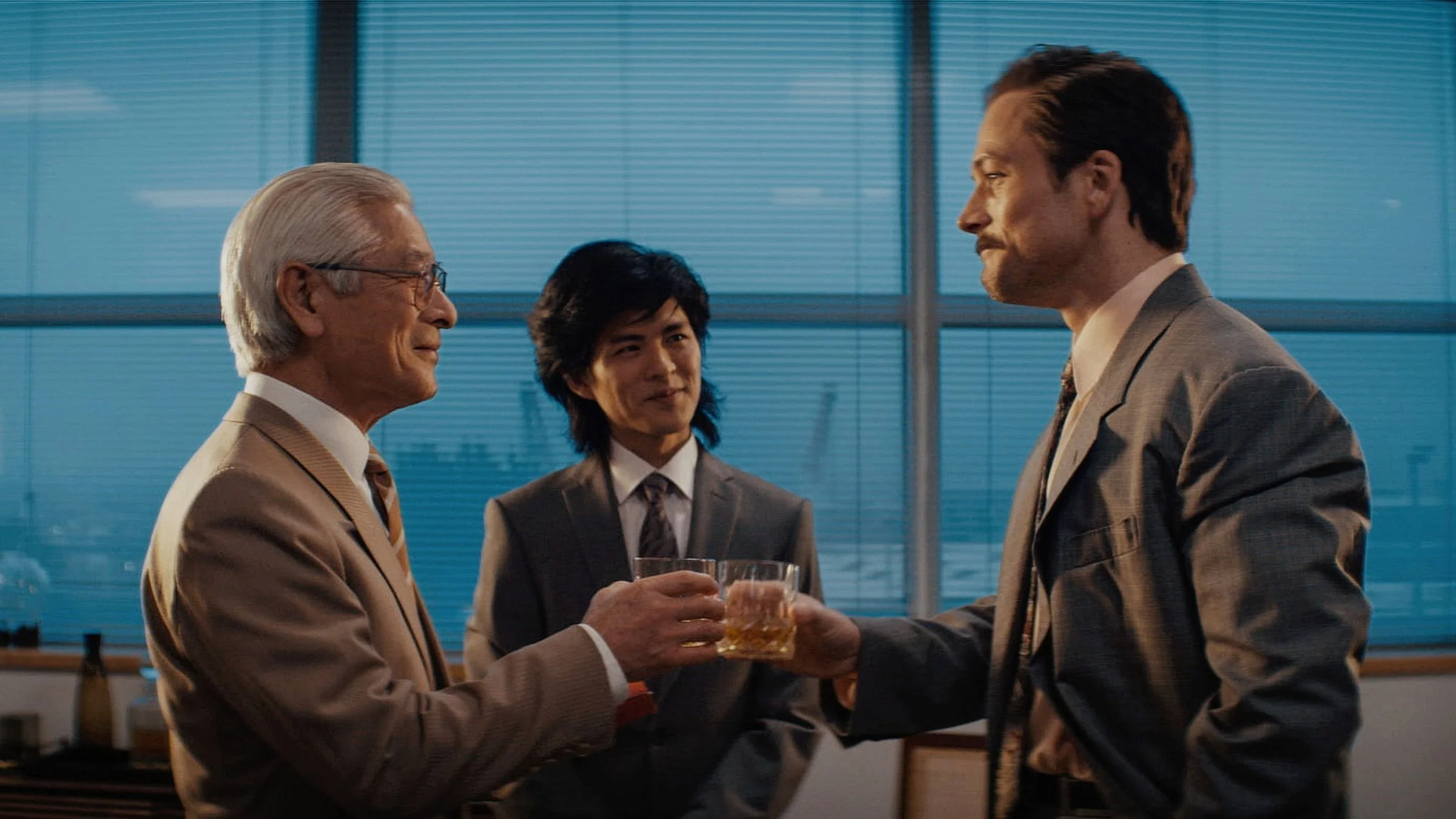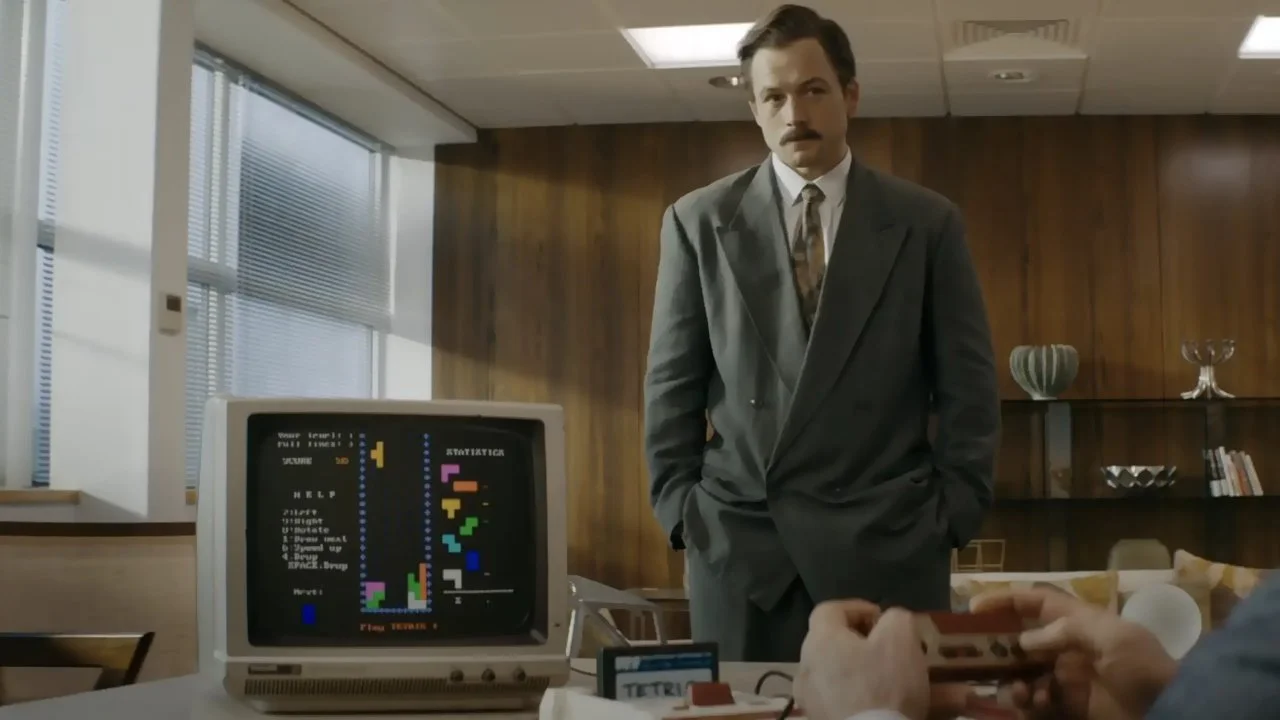For the Sake of Entertainment: Tetris (2023)
Was it just for the views or does Tetris (2023) invite a search for deeper meaning? Guest Writer Abhijith shares his take.
When watching Tetris (2023), I couldn’t shake a single thought: Why is this all so far-fetched? Am I really supposed to believe that Howard Lincoln, the President of Nintendo of America, found himself in a heart-pounding car chase through Moscow, pursued by the KGB over video game rights? Or that the antagonist had enough sway to bring this matter directly to Mikhail Gorbachev, who had far more pressing concerns with the Soviet Union on the verge of collapse? I don’t hate a bit of artistic liberty for the sake of fun—I thoroughly enjoyed Argo (2012), which similarly takes liberties for a crowd-pleasing story. But even so, I couldn’t help but question the creative choices here. What was the reasoning behind taking Tetris, a story with real drama, and reimagining it into a thriller?
The answer I arrived at is simple but telling: It’s more entertaining to watch someone risk it all to achieve their dreams than to watch the intricate legal and political dance that actually happened. A lone man, fighting against a whole government to bring joy to the world, is a story that almost writes itself. It has tension, stakes, and a clear hero’s journey, while the real-life back-and-forth for Tetris’ rights would read more like a courtroom drama. But this creative decision leads us to the central question of this review: Why do so many biopics focus on a single person winning against insurmountable odds?
Tetris has its merits, especially in its soundtrack and visual style. The energetic editing style, punctuated with fun, colorful animated sequences, brings a video-game-like feel to the story that mirrors the playful nature of Tetris itself. The soundtrack is a standout feature, with catchy tracks like “Hold On Tight” by Aespa adding a modern, catchy tone to the film—I've even caught myself humming it while rewatching for this review. The film’s costume design also deserves credit, making characters like Mikhail Gorbachev and Hiroshi Yamauchi look strikingly similar to their real-life counterparts. However, the visual flair and engaging soundtrack aren’t enough to save the movie from its narrative shortcomings. As dazzling as the aesthetics might be, they often feel like a substitute for meaningful storytelling. The film’s focus on spectacle and surface-level drama leaves little room for the depth and complexity that could have elevated the story beyond a typical Hollywoodized recounting of events.
However, despite these strengths, the structure of the movie fails it. The film’s greatest failing lies in its inability to decide who it’s for. It seems torn between appealing to hardcore gamers familiar with Tetris’ history and casual viewers looking for a dramatic underdog story. This indecision alienates both camps. Hardcore fans might find the simplified and dramatized narrative unsatisfying, while casual viewers could feel lost amid the jargon-heavy exposition about licensing rights and Soviet bureaucracy. The result is a film that tries to appeal to everyone but ends up satisfying no one.
The movie’s narrative is built around Henk Rogers as the sole hero battling a web of Soviet corruption and KGB threats, fighting to bring Tetris to the world. This approach, while dramatic, sacrifices much of the story’s nuance. For example, the portrayal of the Soviet Union is excessively cartoonish, leaning heavily into outdated “Red Scare” stereotypes. It seems like every other Russian is a covert KGB spy, with corruption running so rampant that even Gorbachev himself has to step in to "apprehend" the less-loyal elements—a gesture at dramatic tension so far-fetched it nearly veers into parody. This portrayal might be entertaining, but it lacks the subtlety to reflect the real political dynamics and bureaucratic challenges of the Soviet Union at the time.
Another issue lies in the choice of lead. It might initially seem that Alexey Pajitnov, the actual creator of Tetris, would be a more fitting protagonist. However, while Pajitnov’s journey of creating Tetris under the constraints of Soviet life is fascinating, it lacks the inherent drama of Rogers’ high-stakes negotiations and daring navigation of Soviet bureaucracy. Rogers’ role in bringing Tetris to the West and navigating the Soviet bureaucracy is central to the game’s history. The film’s focus on Henk Rogers is ultimately understandable. Rogers’ role in bringing Tetris to the West and navigating the Soviet bureaucracy is central to the game’s history. However, the way Rogers is portrayed misses the mark. The film skips over his introduction to Tetris and casts him as a down-on-his-luck salesman desperate for a win, which flattens his character into a one-dimensional, almost opportunistic figure. Additionally, the relationship between Rogers and Pajitnov—one of the most compelling aspects of the real story—isn’t given the screen time it deserves, leaving Rogers’ motivations feeling thin.
The movie’s structure is clearly designed to appeal to the underdog narrative, pitting Rogers against a formidable enemy and framing his quest as a lone man’s struggle against a global superpower. This setup might make for an inspirational storyline, but it sacrifices much-needed depth. Key events, like Nintendo’s lawsuit against Atari to secure exclusive rights to Tetris, are glossed over, missing the chance to add moral complexity to the story. These legal battles reveal the reality of business in a competitive, globalized market, where not every action is as righteous as it might seem. Instead, the film opts for a feel-good arc where a morally upright businessman faces impossible odds and is ultimately rewarded for his courage and integrity, leaving us with a story that feels more like a familiar Hollywood fable than the nuanced history behind one of gaming’s greatest legacies.
This tendency to simplify non-Western stories into inspirational tales for Western audiences isn’t unique to Tetris. Western films often feel comfortable taking liberties with details about non-Western regions; for example, in Top Gun: Maverick, the antagonist is an unnamed, vaguely Eastern country, as if the specifics don’t matter. Similarly, this film doesn’t adhere to a consistent portrayal of the crumbling USSR, relying instead on a simplified view that Western audiences won’t question. By subscribing to this West-centric perspective, the movie sacrifices an opportunity to offer a richer exploration of the USSR at a turning point in its history, as well as the realities its citizens faced.
This brings us back to the question I posed at the start. Why do so many biopics focus on a single person winning against insurmountable odds? As the movie demonstrates, it’s easier to entertain than to explore. While this approach may deliver a satisfying hero’s journey, it ultimately robs the story of its historical nuance, leaving audiences with a one-dimensional tale in place of the complex story behind one of gaming’s most beloved legacies.
Images in this article are being used under Fair Use guidelines as part of Singapore's Copyright Act 2021



